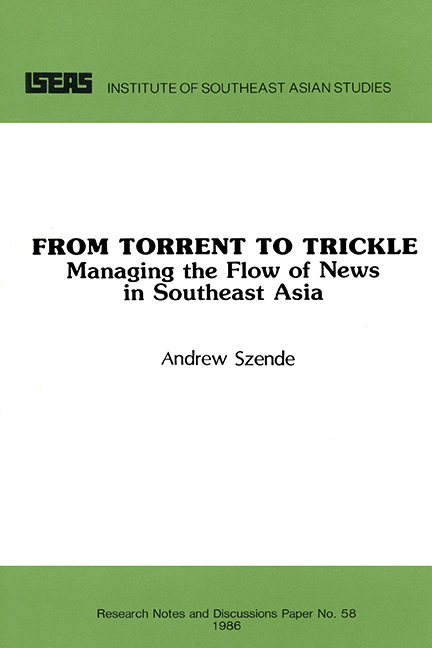APPENDIX C
Published online by Cambridge University Press: 21 October 2015
Summary
This is a selection of criticism of the ASEAN news exchange, by respondents to this study.
1. International relations: It is very weak in analytical, interpretive stories. It does not try to assess or analyse a situation or to forecast what is likely to happen.
2. Business, finance, economic development: Much of the coverage seems to be platitudinous rehashes of ministers' speeches or government announcements, but very little analysis. Reporting on economic issues is generally very unreliable.
3. Culture and entertainment: It is very low on the priority scale of both news agencies and newspapers. It takes a journalist with a very sensitive knowledge of the particular country and such journalists are very difficult to find.
4. Defence and military affairs: It is treated as confidential and little is written on it except official announcements and statements.
5. Domestic politics: ASEAN countries do not spend enough effort to explain the intricacies of their domestic politics to their neighbouring countries. In many cases, it is a hit and run affair. It requires great sensitivity to cover each other's domestic politics well. There is a lack of continuous coverage.
6. Health, education, welfare: Does not enjoy the necessary priority in coverage.
7. Energy, environment and science: It is low on list of priorities, because it might require some special knowledge and because of a feeling that they have nothing to offer each other.
8. Agriculture and food: In spite of its importance to the region, it gets too little attention.
9. Justice, crime and human rights: Because they are sensitive to outsiders writing about these subjects from their own countries, they are reluctant to carry such news about their neighbouring countries. There is a feeling that people in the neighboring countries are not very interested in questions of justice in another country. There is considerable self-censorship in all ASEAN countries particularly about human rights issues involving governments.
10. Sports: Lack of continuous coverage from each country.
11. Disasters: The international agencies tend to be faster and more accurate with more details of what happened.
12. Lifestyles and living standards: Each country is preoccupied with its own problems and does not want to discuss them in the press of its neighbours. It would require great sensitivity to do it in a way that it would not be offensive to someone, so it is not done at all.
- Type
- Chapter
- Information
- From Torrent to TrickleManaging the Flow of News in Southeast Asia, pp. 132 - 133Publisher: ISEAS–Yusof Ishak InstitutePrint publication year: 1986

